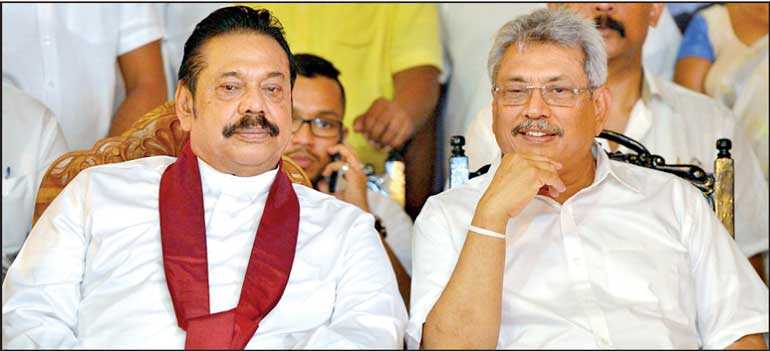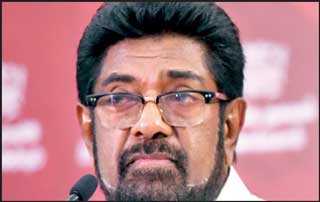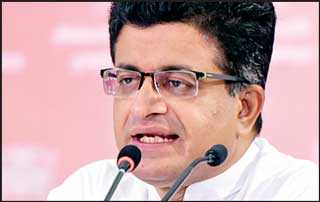Sunday Feb 22, 2026
Sunday Feb 22, 2026
Wednesday, 21 October 2020 00:00 - - {{hitsCtrl.values.hits}}

President Gotabaya Rajapaksa and Prime Minister Mahinda Rajapaksa - File Photo
By Uditha Jayasinghe and Chandani Kirinde
The highly contentious 20th Amendment with changes approved by Cabinet on Monday comes up for a two-day debate from today onwards in Parliament amidst mounting criticism by the Opposition, certain sections of clergy, civil society and professionals.
 |
| Cabinet Spokesman Keheliya Rambukwella
|
 |
| Cabinet Co-Spokesman Udaya Gammanpila
|
Ahead of the parliamentary debate, Cabinet approved three changes including maintaining the limits of Cabinet and Non-Cabinet Ministers as outlined in the 19th Amendment, limiting the scope of urgent bills and allowing State corporations to be audited by the Auditor General.
Cabinet Co-Spokesman Udaya Gammanpila told reporters at the weekly Cabinet briefing yesterday that the changes were made following extensive discussions at the Cabinet meeting held on Monday. He noted that the Cabinet also considered several submissions made by the clergy, coalition political parties and other organisations.
“Cabinet decided to retain the limits imposed by the 19th Amendment on the number of Cabinet Ministers, which is 30 and 40 Non-Cabinet and Deputy Ministers. In addition, the Cabinet also decided to limit the scope of urgent bills so they can only be presented if they pertain to national security or national disasters.
Thirdly, the Cabinet decided to protect the Auditor General’s powers as they exist within the Constitution and allow the department to audit corporations under the State,” he said.
Gammanpila added that four other changes will also be made to the 20th Amendment, which includes changes to clauses three and 14 of the current draft as was pledged by the Attorney General before the Supreme Court as well as reinstating the ability for citizens to submit Fundamental Rights petitions against the President and allow the Elections Commission to continue monitoring media during an election period.
“There were also detailed discussions at the Cabinet meeting on the clause that allows dual citizens to hold office in parliament. The National Freedom Front and the Pivithuru Hela Urumaya are among the parties that have expressed their concern about this and discussions on its ramifications are continuing. We are hopeful that at the Committee Stage this issue will be addressed and we will work towards that goal,” Gammanpila said.
Cabinet Spokesman and Media Minister Keheliya Rambukwella responding to questions stated the public should wait till the vote tomorrow to see if the Government has enough votes to meet the two-thirds majority or not. He stressed that the proposed changes were taken on board as the current Government was one that respected democracy and the democratic process.
Separately, Speaker of Parliament Mahinda Yapa Abeywardena yesterday announced the Supreme Court (SC) determination on the Bill titled ’20th Amendment to the Constitution’, ahead of the two-day debate which begins this morning.
He said the Bill can be passed by Parliament with a two-thirds majority without a referendum, provided that four clauses in the Bill which are inconsistent with the Constitution are amended during the Committee Stage.
Making the announcement, the Speaker said that the SC has determined clauses three, five, 14 and 22 in their present form are inconsistent, with the Article three read with Article four of the Constitution and therefore require approval by the people at a referendum by virtue of the provisions of Article 83.
These include the clauses in the Bill repealing the President’s duty to create the conditions for the holding of free and fair elections as requested by the Election Commission, the dissolution of Parliament within one year of an election, of Presidential immunity to the extent of preventing fundamental rights challenges by citizens and the removal of the constitutional duty on public officers to obey directives of the Election Commission with failure to do so being an offence.
“However, such inconsistency in clauses three and 14 would cease by amending in accordance with the proposed Committee Stage amendments and consequently would not require approval by the people at a referendum,” the SC said.
The Government said it will move several amendments to the Bill tomorrow during the third reading of the Bill.